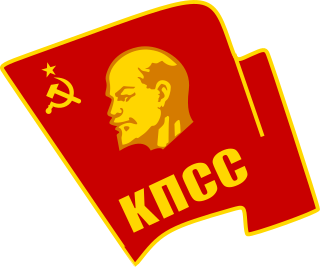
The Communist Party of the Soviet Union (CPSU), at some points known as the Russian Communist Party, All-Union Communist Party and Bolshevik Party, and sometimes referred to as the Soviet Communist Party (SCP), was the founding and ruling political party of the Soviet Union. The CPSU was the sole governing party of the Soviet Union until 1990 when the Congress of People's Deputies modified Article 6 of the 1977 Soviet Constitution, which had previously granted the CPSU a monopoly over the political system. The party's main ideology was Marxism–Leninism. The party was outlawed under Russian President Boris Yeltsin's decree on 6 November 1991, citing the 1991 Soviet coup attempt as a reason.

Leninism is a political ideology developed by Russian Marxist revolutionary Vladimir Lenin that proposes the establishment of the dictatorship of the proletariat led by a revolutionary vanguard party as the political prelude to the establishment of communism. Lenin's ideological contributions to the Marxist ideology relate to his theories on the party, imperialism, the state, and revolution. The function of the Leninist vanguard party is to provide the working classes with the political consciousness and revolutionary leadership necessary to depose capitalism.

Marxism–Leninism is a communist ideology that became the largest faction of the communist movement in the world in the years following the October Revolution. It was the predominant ideology of most communist governments throughout the 20th century. It was developed in Russia by Joseph Stalin and drew on elements of Bolshevism, Leninism, and Marxism. It was the state ideology of the Soviet Union, Soviet satellite states in the Eastern Bloc, and various countries in the Non-Aligned Movement and Third World during the Cold War, as well as the Communist International after Bolshevization.
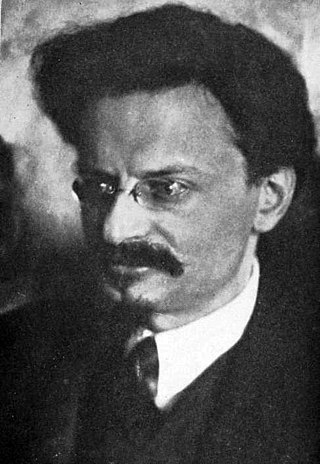
Trotskyism is the political ideology and branch of Marxism developed by Russian revolutionary and intellectual Leon Trotsky along with some other members of the Left Opposition and the Fourth International. Trotsky described himself as an orthodox Marxist, a revolutionary Marxist, and a Bolshevik–Leninist as well as a follower of Karl Marx, Frederick Engels, Vladimir Lenin, Karl Liebknecht, and Rosa Luxemburg. His relations with Lenin have been a source of intense historical debate. However, on balance, scholarly opinion among a range of prominent historians and political scientists such as E.H. Carr, Isaac Deutscher, Moshe Lewin, Ronald Suny, Richard B. Day and W. Bruce Lincoln was that Lenin’s desired “heir” would have been a collective responsibility in which Trotsky was placed in "an important role and within which Stalin would be dramatically demoted ".
Bolshevism is a revolutionary socialist current of Soviet Leninist and later Marxist–Leninist political thought and political regime associated with the formation of a rigidly centralized, cohesive and disciplined party of social revolution, focused on overthrowing the existing capitalist state system, seizing power and establishing the "dictatorship of the proletariat".
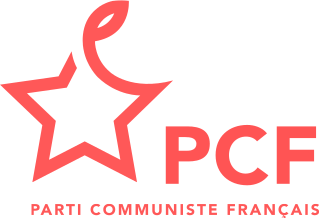
The French Communist Party is a communist party in France. The PCF is a member of the Party of the European Left, and its MEPs sit with The Left in the European Parliament – GUE/NGL group.

The Revolutionary Socialist Party (RSP) is a communist party in India. The party was founded on 19 March 1940 by Tridib Chaudhuri and has its roots in the Bengali liberation movement Anushilan Samiti and the Hindustan Socialist Republican Army.

The Revolutionary Socialist League (RSL) was a Trotskyist group in the United States established in 1973 and disbanded in 1989.
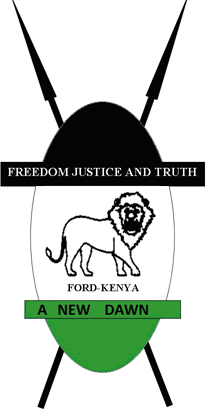
Forum for the Restoration of Democracy–Kenya (FORD–Kenya) is a Kenyan political party. The party has sat in the government of Kenya once, under the National Rainbow Coalition, from 2003 to 2007, having ended forty years of one party rule. In April 2022, the party joined the Kenya Kwanza coalition for the August 2022 elections, and is headed by Moses Wetangula, the current speaker of the National Assembly of Kenya. The party tends to be more popular among the Luhya people.

The Wiper Democratic Movement–Kenya (WDM-K), formerly Orange Democratic Movement–Kenya (ODM–Kenya), is a political party in Kenya, which originated as a result of the 2005 Kenyan constitutional referendum. The party tends to be more popular among the Kamba people. It is headed by Kalonzo Musyoka, who ran for president in 2007 and served as the vice-president in the Grand Coalition of Mwai Kibaki and Raila Odinga. He is now a member of the main opposition Azimio La Umoja One Kenya Party.

Before the perestroika Soviet era reforms of Gorbachev that promoted a more liberal form of socialism, the formal ideology of the Communist Party of the Soviet Union (CPSU) was Marxism–Leninism, a form of socialism consisting of a centralised command economy with a vanguardist one-party state that aimed to realize the dictatorship of the proletariat. The Soviet Union's ideological commitment to achieving communism included the national communist development of socialism in one country and peaceful coexistence with capitalist countries while engaging in anti-imperialism to defend the international proletariat, combat the predominant prevailing global system of capitalism and promote the goals of Bolshevism. The state ideology of the Soviet Union—and thus Marxism–Leninism—derived and developed from the theories, policies, and political praxis of Marx, Engels, Lenin, and Stalin.
The United Democratic Movement (UDM) is a political party that was founded in 1999 by politicians who were at the time considederd to be renegades from the then ruling party Kenya African National Union but was denied registration by the then head of state Daniel Toroitich Arap Moi and most of its then leaders went to other parties by the time of the 2002 general elections.

The Militant faction was an organized grouping of Marxists in the Socialist Party of America (SPA) who sought to steer that organization from its orientation towards electoral politics and towards direct action and revolutionary socialism. The faction emerged during 1930 and 1931 and achieved practical control of the organization in 1934. The existence of the "Militants" and the threat they represented to the political line of the SPA caused traditional electorally oriented members to form an organized grouping of their own, known as the "Old Guard faction." In 1935 the personal and political friction between these two basic tendencies lead to an organizational split, with the Old Guard faction leaving to establish the Social Democratic Federation (SDF). The Militant faction itself shattered in the aftermath of the 1935 party split with only a small core loyal to perennial Presidential candidate Norman Thomas remaining in the organization by the coming of World War II.
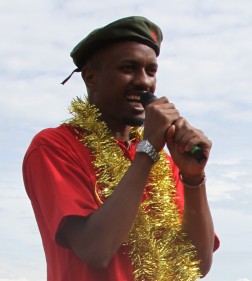
Benedict Wachira is a Kenyan communist political and social justice activist. He is also the General Secretary of the Communist Party of Kenya (CPK).

The Communist Party of Kenya (CPK), is a political organisation in Kenya. Founded in 1992 as the Social Democratic Party (SDP), the political party has undergone substantial transformations in its name, ideological orientation from social democracy to communism and political positioning. Throughout its history, the Communist Party of Kenya has faced distinct challenges and played a notable role in Kenya's political evolution.
The Chinese Communist Party (CCP) frames its ideology as Marxism–Leninism adapted to the historical context of China, often expressing it as socialism with Chinese characteristics. Major ideological contributions of the CCP's leadership are viewed as "Thought" or "Theory," with "Thought" carrying greater weight. Influential concepts include Mao Zedong Thought, Deng Xiaoping Theory, and Xi Jinping Thought. Other important concepts include the socialist market economy, Jiang Zemin's idea of the Three Represents, and Hu Jintao's Scientific Outlook on Development.
Orthodox Marxism is the body of Marxist thought which emerged after the deaths of Karl Marx and Friedrich Engels in the late 19th century, expressed in its primary form by Karl Kautsky. Kautsky's views of Marxism dominated the European Marxist movement for two decades, and orthodox Marxism was the official philosophy of the majority of the socialist movement as represented in the Second International until the First World War in 1914, whose outbreak caused Kautsky's influence to wane and brought to prominence the orthodoxy of Vladimir Lenin. Orthodox Marxism aimed to simplify, codify and systematize Marxist method and theory by clarifying perceived ambiguities and contradictions in classical Marxism. It overlaps significantly with instrumental Marxism.

Kenya Kwanza is a Kenyan political alliance currently headed by William Ruto. The political coalition currently holds the speakership position in both the National Assembly and Senate of Kenya. It was formed in the period leading up to the 2022 Kenyan general election, originally consisting of three parties: the United Democratic Alliance (UDA), Amani National Congress and FORD–Kenya. By 8 April 2022, several more political parties had joined the alliance, bringing the total number of constituent parties to 12. On 18 August 2022, a number of politicians from the United Democratic Movement announced they would be joining the alliance.
The Internationale is a socialist anthem that was originally composed in French by Eugène Pottier in 1871, after the fall of the Paris Commune. The lyrics advocate for solidarity, class struggle, and internationalism among the working class. The melody was later created by Pierre De Geyter in 1888. Over the years, the song has been translated into numerous languages and embraced as an anthem by various leftist and labour movements around the globe.

Booker Ngesa Omole is a Kenyan politician and activist known for his commitment to Marxist-Leninist ideology. He currently serves as the general secretary of the Communist Party Marxist - Kenya (CPMK), a position he assumed following the transition of the Communist Party of Kenya (CPK) into the CPMK. Prior to this role, Omole held the position of National Vice Chairperson of CPK, where he played a significant part in the party's evolution and ideological direction.















